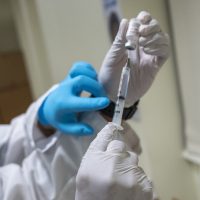Social media posts repeatedly misuse unverified data from the Vaccine Adverse Event Reporting System to falsely claim that COVID-19 vaccines are dangerous, and even lethal. But the government database is not designed to determine if vaccines cause health problems.
Misconception: Vaccination
Pfizer CEO Got Vaccinated, Contrary to Claim in Video
Texas Doctor Spreads False Claims About COVID-19 Vaccines
Federal officials authorized two mRNA vaccines for COVID-19 after they were determined to be safe and effective against symptomatic illness in clinical trials. But a Texas doctor, in a widely shared video, falsely claims the vaccines don’t provide protection and that they’re actually “experimental gene therapy.”
Instagram Post Misrepresents FDA Document About Monitoring Vaccine Safety
Hagler’s Widow Refutes Rumors About How He Died
RFK Jr. Video Pushes Known Vaccine Misrepresentations
Video Targets Gates With Old Clip, Misleading Edit
In a 2010 TED Talk focused on developing new technologies to drastically reduce carbon dioxide emissions, Bill Gates briefly mentioned reducing the rate of population growth. A conspiratorial video circulating on Facebook misleadingly edits Gates’ talk to suggest his “wish” was to depopulate the planet through vaccines.
What does it mean to say a vaccine has 94% percent efficacy or higher?
Efficacy is a measure of how well a vaccine performs in a clinical trial. It specifically refers to a relative reduction in infection or disease when comparing the vaccinated group to the placebo (or control) group.
For instance, both the Pfizer/BioNTech and Moderna vaccines were primarily evaluated for their ability to prevent symptomatic COVID-19, with the former having a 95% efficacy and the latter having a 94% efficacy in the clinical trial data submitted for the original authorization by the Food and Drug Administration.
What side effects should you expect if you get a COVID-19 vaccine?
Common side effects of the COVID-19 vaccines include injection site pain, fatigue, headache, muscle pain and fever.
Data from the Pfizer/BioNTech and Moderna trials also show the side effects included joint pain and chills. These reactions are more likely after the second dose of those vaccines, given several weeks after the first, and are more common and severe in younger people.
How do we know what ingredients are in the COVID-19 vaccines?
The full ingredient list for any authorized or approved COVID-19 vaccine can be found on the Centers for Disease Control and Prevention website and in a variety of documents on the Food and Drug Administration’s website, including in a fact sheet for vaccine recipients that’s available in numerous languages.
Both the Pfizer/BioNTech and Moderna vaccines contain messenger RNA,






